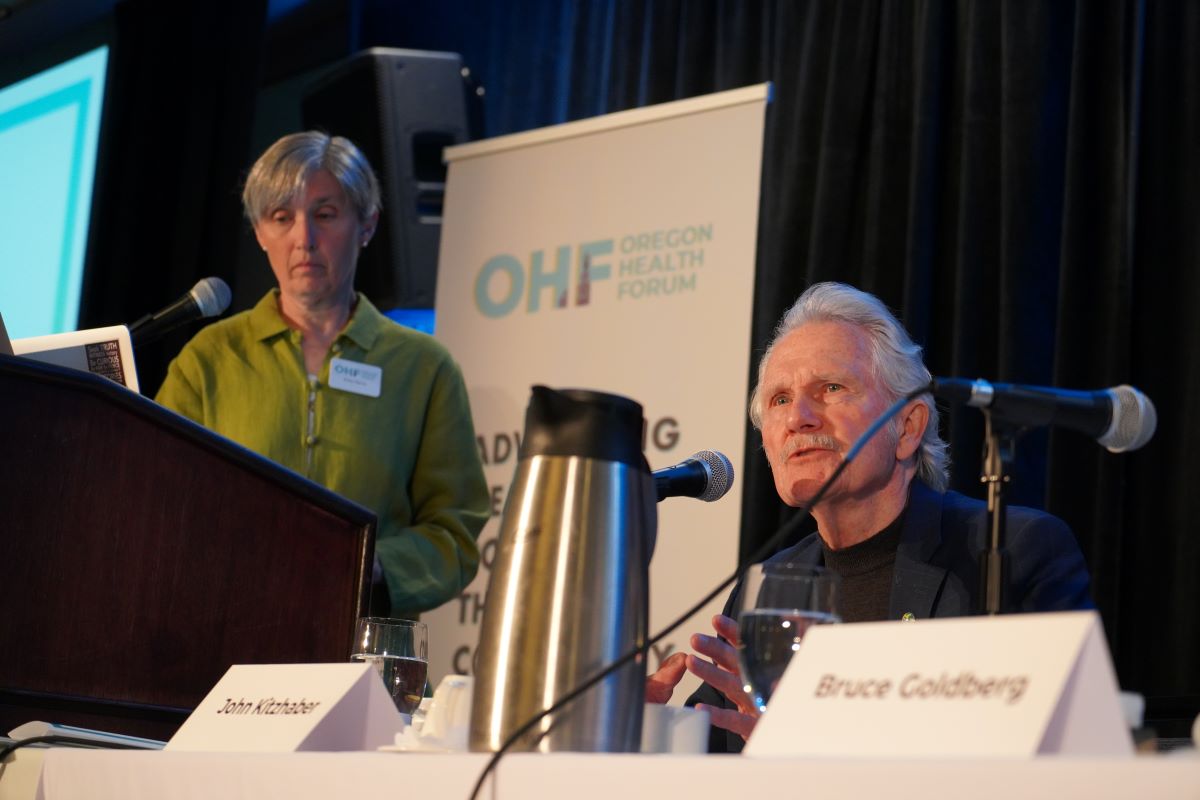
Oregon drew national acclaim more than a decade ago when it launched a bold plan to remake the health care system starting with the program offering free care to low-income people, the Oregon Health Plan.
Today, as the state prepares to consider revamping the program, some progress has been made — but far more needs to be done to address rising costs, workforce shortages and racial and ethnic disparities, a panel of health policy heavyweights agreed on Wednesday.
At the event, former Gov. John Kitzhaber and former Oregon Health Authority leader Bruce Goldberg detailed the vision behind reforms they spearheaded to Oregon’s Medicaid program over a decade ago. LifeWorks NW CEO Mary Monnat provided a ground-level view of behavioral health, and new Oregon Health Authority Director Sejal Hathi and state Rep. Rob Nosse described their vision for future reforms. Roughly 300 attended the “Oregon’s health crossroads” panel organized by the Oregon Health Forum, a sister organization of The Lund Report. It was moderated by journalist Emily Harris.
The discussion provided a close-up look at how Hathi, who started in the job in January, will interact with the policies she inherited. Among other things, the former New Jersey public health official called prevention — including gun control — a key to reducing suicides.
“One of the leading causes of suicide is guns,” she said, and called Oregon’s firearm safety laws surprisingly “anemic.” She added, “We have not done enough to require our providers to similarily engage in suicide prevention training.”

Hathi asked why Oregon isn’t part of the interstate medical licensure compact, which streamlines the process for doctors to practice in multiple states.
“We could centralize licensing. Why are we not part of the interstate medical licensure compact? … I think my newcomer’s naivete helps me see potential pathways that others do not.”
Saying reforms will be a group effort, she challenged providers and institutions such as Oregon Health & Science University to step up.
“What can our provider associations do? What can our medical schools do?” she said. “Why is OHSU not making medical school tuition free for every (graduate) who commits to going into primary care?
Scattered applause broke out. Nosse quipped, “You hang on (to) being new as long as you can.”
OHSU did not immediately respond to a request for comment on Hathi’s question about free tuition.
Flexibility to eliminate waste
Kitzhaber and Goldberg told the audience that changes they oversaw kept Oregonians on the Medicaid-funded Oregon Health Plan while improving care and cutting waste.
“We demonstrated that a locally designed and locally directed health care delivery system can maintain quality and expand access to reduce costs,” Kitzhaber said.
But both said that key aspects of the vision remain unfulfilled.
“This was meant as a pilot,” Goldberg, the founding director of the Oregon Health Authority, said. “And it was meant as a pilot to see if we can improve cost and quality Medicaid, then perhaps we should extend this into the rest of the healthcare system.”
Chief among those was a plan to give flexible spending authority to coordinated care organizations, known as “CCOs,” essentially highly regulated regional insurers contracted by the state to oversee care.
The so-called “global budget” flexibility was supposed to break down barriers, replace the fee-for-service model that experts say promotes inefficiencies, and shift the system’s focus to achieving health rather than just paying for care.
“The global budget was a way for us to reward efficiency and allow the CCOs to reinvest back into their communities to improve health,” Kitzhaber said.
“And it was meant as a pilot to see if we can improve cost and quality Medicaid, then perhaps we should extend this into the rest of the healthcare system,"
But federal Medicaid officials curbed the “global budget” idea after initially approving it. So, Kitzhaber said, the state has reverted to more traditional payments based on rate setting.
“If the CCO spends money in the community on things that will improve health and that doesn’t have a billing code, they lose money in the next year; the (state reimbursement) rates go down,” he said. “It’s just crazy, right?”
Nosse, a Portland Democrat, said that moving toward a global budget or “value-based payments” could be politically difficult. He said that federal health authorities are reluctant to give states what might be perceived as a block grant, a set amount of money to run their Medicaid programs.
But Kitzhaber said spending flexibility is essential for coordinated care organizations to fulfill their missions, and the state should renew its attempt to win federal approval.
“Absolutely,” he said. “I don’t think the model works if we basically fall back to the old blueprint.”
Mixed views on behavioral health integration
Hathi said she wanted behavioral health prioritized in the next round of state contracts with coordinated care organizations. She said that more than a quarter of Oregonians have a mental illness of substance use challenge, yet less than half receive treatment.
She said she’s been thinking about how to support and incentivize coordinated care organizations to better address mental health care, “because that’s where we really struggled, I think, during the past several years.”
Behavioral health in Oregon has been underfunded and under-resourced for decades, she said. She called the $1.5 billion lawmakers have recently approved for it welcome, but a “drop in the bucket.”

“At the end of the day, we can’t just throw darts at a board and hope that you strike a panacea,” she said. “We need a real vision and a strategy for how we’re going to transform the system and ensure coordinated, integrated, culturally responsive system of services and care that meet everyone’s needs and work for everyone, child, adult and family in this state.”
But while other speakers called for a more integrated system of behavioral health, Nosse seemed reluctant to give coordinated care organizations a bigger role.
“I just want more providers and more appointments and more access and less wait time,” he said. “But if I make the CCOs more at risk for delivering care, does that mean they figure out how to find more providers, or entice more people to do this work?”
He questioned whether putting coordinated care organizations in charge of building the residential treatment facilities the state needs would pay off.
Goldberg proposed what he called a “provocative” idea to address the state’s behavioral health problems. He said the state should pause all metrics-based incentive payments for coordinated care organizations other than for a new incentive: making sure that anyone who has a mental health or substance abuse problem gets care within 24 hours.
Asked to respond, Hathi first quipped, “Desperate times call for desperate measures.”
Pressed on whether this was an endorsement, she drew laughter from the audience with her noncommital response. “It’s certainly an idea I look forward to discussing with Dr. Goldberg.”
Monnat said that a bigger issue was the lack of behavioral health work force. She said there are providers that are on the verge of closing if three people quit.
“All the progress we're making is for naught if we cannot invest in a behavioral health workforce,” she said. “We have 100 openings at LifeWorks right now.”
While she appreciated investments the Legislature has made in recent years, Monnat called for a “GI bill for behavioral health” that pays people to go to school instead of just offering loans.
“All the progress we're making is for naught if we cannot invest in a behavioral health workforce,”
Vision of local control, local spending
Harris, the panel’s moderator, asked the panel about one of the central principles of coordinated care organizations: local control and say in how Oregon Health Plan funds are spent.
She described how the website of a Portland-area coordinated care organization, Health Share of Oregon, had no agendas or dates for future meetings. But last July the council broke into small groups to discuss the power it “does or does not hold” and what it needs to fulfill its role.
Kitzhaber said the real question is whether each coordinated care organization has “the right makeup” for their governing board. Early on the boards were envisioned as having more community membership and influence.

The discussion turned to how coordinated care organizations have amassed large amounts of cash during the pandemic and whether enough of that money is being invested in Oregon rather than going out of state. Reporting by The Lund Report found that coordinated care organization reserves have increasingly flowed out of state in recent years.
“I basically feel very strongly that the resources should stay in the community,” Kitzhaber said to applause.
He said that Oregon had received public dollars in the form of Medicaid to improve the health care and well-being of Oregonians and spending that money locally was central to the entire system. But how that money should be spent, he added, is open for debate.
“I think those resources need to flow through a locally designed and locally directed delivery model that addresses the root causes of childhood trauma and adverse experience,” he said.
Hathi plans equity revamp as deadline nears
Hathi brought up the health authority’s goal to eliminate health inequities by 2030.
“How do we refract that goal across the lenses of affordability of health coverage, behavioral health system transformation prevention?” she said.
She said she’s been focusing on how to reenergize the agency’s approach and said the Oregon Health Plan is part of it, including through the contracts issued to coordinated care organizations, “I do see equity being more intentionally embedded in the next contract.”
"I think my newcomer’s naivete helps me see potential pathways that others do not,”
She said that the health authority is working with Gov. Tina Kotek’s office and is in the early stages of its strategy for the new contracts slated to go into effect in 2027.
The upcoming contracting process is often referred to as “CCO 3.0” because it’ll be the third round of contracts.
Kitzhaber asked for a new name be given to the process, one that’s more descriptive and “will actually motivate people.”
Challenged to answer his own question, Kitzhaber’s response drew laughter. “How about ‘Saving the World?’”